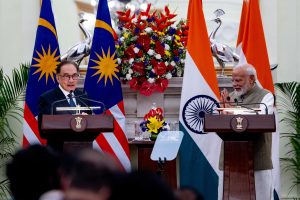India and Malaysia pledged to expand their relations on the economic and security front, as Prime Minister Narendra Modi hosted his Malaysian counterpart Anwar Ibrahim in New Delhi yesterday.
Speaking at a press conference, Modi said that since Anwar took office in late 2022, “there has been a new momentum and energy in our partnership.”
“Today we have decided that our partnership will be elevated to a ‘Comprehensive Strategic Partnership,’” he said, Reuters reported. While he did not elaborate on what this partnership would consist of, he expressed faith that “that there is still a lot of potential in economic cooperation. Bilateral trade and investment should be expanded.”
“In areas which require new and modern technology like semiconductor, fintech, defense industry, AI and quantum technology, we will increase cooperation,” Modi added.
Prior to their meeting yesterday, the Associated Press reported, Anwar received a ceremonial welcome at Rashtrapati Bhavan, India’s presidential palace, before visiting the Rajghat memorial to Indian independence leader Mahatma Gandhi.
There are a lot of historical threads connecting India to Malaysia – most obviously, the latter is home to around 3 million Malaysians of Indian heritage – but relations have been bumpy in recent years. In 2019, Malaysia’s irascible Prime Minister Mahathir Mohamad came out strongly against the Modi government’s policies in Kashmir – particularly, the controversial decision to revoke the long-standing autonomy of India’s portion of the Kashmir valley. This prompted Indian traders to urge a boycott of Malaysian palm oil, the country’s leading export to India, and prompted a distinct cooling of relations.
However, the two sides appear to have transcended this minor crisis, and economic interactions are once again growing at a steady pace. Last year, Malaysia became India’s third-largest trading partner in Southeast Asia, with the growth mostly driven by palm oil and electronics. There are also small, though increasing, numbers of Indian citizens working in the country. According to Malaysian government statistics cited by Nikkei Asia, Indian tourist arrivals in Malaysia have surged by 165 percent to 325,000 in the second quarter of the year, compared to 2019 figures.
During yesterday’s meeting, Modi and Anwar agreed to encourage the movement of workers and the use of their own currencies to settle bilateral transactions.
In a subsequent Facebook post, Anwar stated that the two nations wished to promote both public and private sector cooperation, “particularly in challenging areas such as energy transition, digitalization, and food security.”
“Specifically I stressed the importance of cooperation in the semiconductor industry, with Malaysia recognized as a hub in Southeast Asia, and acknowledging India’s achievements in this field,” he wrote. “We are both committed to making sure Malaysia and India emerge as two strong and friendly countries in a short period of time.”
In a press conference yesterday, Reuters reported, Indian Foreign Ministry official Jaideep Mazumdar said that India would make a one-off export of 200,000 metric tons of non-basmati rice to Malaysia, making an exception to a ban on such shipments. Mazumdar said India also looks at Malaysia as a possible market for defense equipment, and aircraft manufactured by the state-run Hindustan Aeronautics Ltd.
With the controversies over Kashmir now in the rearview mirror, both nations have an interest in improved relations. New Delhi no doubt realizes that its relations with Malaysia, as with Southeast Asia as a whole, lag behind their potential, especially given the historical connections between the two countries. Its pursuit of more substantial ties is consistent with its approach of building up relations with Southeast Asian countries to help counterbalance China’s economic heft in the region.
For his own part, Anwar has no doubt also sought support from Modi for his country’s planned accession to the expanding BRICS grouping, which includes India, Russia, and China. Last month, the Malaysian leader announced that Malaysia had submitted an application for membership to the Russian government, the current chair of the grouping. India and Malaysia have a common self-perception as leading voices of the “Global South,” and will likely find common ground in strengthening their influence within a more diverse and multipolar global order.

































